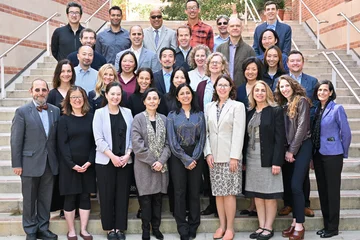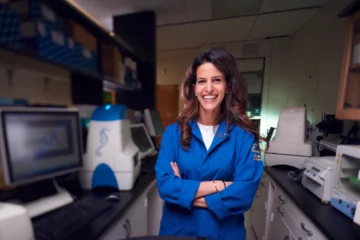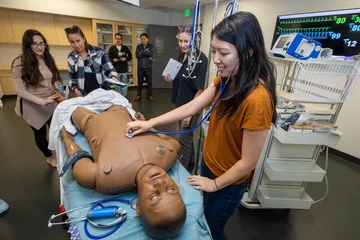A Day in the Life of Dr. David Reuben, Chief for the Division of Geriatrics
An elderly patient has not eaten all day. The nurse asks him to take a few bites, but he refuses. Later that afternoon, a Companion Care Program volunteer enters the room and makes idle conversation. The volunteer then asks the patient if he is hungry. Soon, with assistance from the volunteer, the patient eats his first meal of the day—a pleasant surprise for the nurse.
In the UCLA Companion Care Program, volunteers regularly visit elderly patients at Ronald Reagan UCLA Medical Center to talk, listen, play games and provide companionship. Many of these patients would be alone without their volunteers.
"Hospitalizations are very precarious times for older people," says David Reuben, MD. "It's like sending people up into space."
Dr. Reuben is Chief, Division of Geriatrics at UCLA, and the Archstone Foundation Chair and Professor at the David Geffen School of Medicine at UCLA. He is also a member of the Companion Care Program staff. "Older people who come to the hospital are frequently all alone, not because they don't have family but more and more because family caregivers are increasingly busy, particularly if they are the children of hospitalized patients or if they are the spouses," says Dr. Reuben.
Paying It Forward as a Companion Care Program Volunteer
To date, the hospital has recruited more than 50 volunteers to serve as companions. They want to recruit 200 volunteers to work daily in 4-hour shifts from 7 am to 11 pm. Volunteers train and commit to 150 hours of service.
"One of the things we emphasize is to learn people’s stories—how they came to Los Angeles, what their life was like as a young person," Dr. Reuben says. "We've had some patients who migrated from the south who talk about civil rights, or their wartime experiences or people who immigrated from Europe during World War II—just amazing stories."
Most volunteers are college students, many from UCLA, eager to learn and willing to help. Pedro Jimenez is the Companion Care volunteer supervisor.
"I have spoken to patients who have been visited by a volunteer," says Jimenez. "One patient told me, 'They were very kind and attentive to what I had to say. They were really a sight for sore eyes, and it made my hospital stay so much better.'"
(Related Article: The Health Effects of Loneliness)




